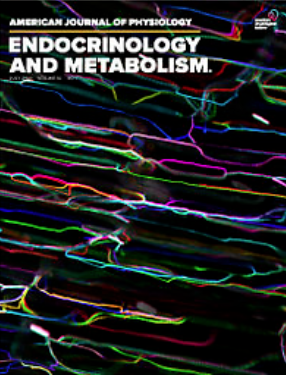甲状腺滤泡细胞的增殖和成熟需要 TAF1 通过 Notch 信号传递。
IF 4.2
2区 医学
Q1 ENDOCRINOLOGY & METABOLISM
American journal of physiology. Endocrinology and metabolism
Pub Date : 2024-04-24
DOI:10.1152/ajpendo.00403.2023
引用次数: 0
摘要
甲状腺发育不良(TD)是先天性甲状腺功能减退症(CH)的常见致病机制。此外,已知的致病基因仅限于那些直接参与甲状腺发育的基因。为了找出更多的候选致病基因,我们在斑马鱼中进行了TD的正向遗传筛选,然后进行了定位克隆。候选基因在体外通过Nthy-ori 3.1细胞系得到确认,在体内通过斑马鱼模式生物得到确认。我们获得了甲状腺发育不良的新型斑马鱼品系,并通过定位克隆确定了候选致病基因 taf1。进一步的分子研究发现,taf1需要通过与NOTCH1启动子区域结合来促进甲状腺滤泡细胞的增殖。敲除TAF1会影响甲状腺细胞的增殖和成熟,从而导致甲状腺发育不良。这项研究表明,TAF1促进了Notch信号转导,这种关联在甲状腺发育过程中起着关键作用。本文章由计算机程序翻译,如有差异,请以英文原文为准。
TAF1 is needed for the proliferation and maturation of thyroid follicle cells via Notch signaling.
Thyroid dysgenesis (TD) is the common pathogenic mechanism of congenital hypothyroidism (CH). In addition, known pathogenic genes are limited to those that are directly involved in thyroid development. To identify additional candidate pathogenetic genes, we performed forward genetic screening for TD in zebrafish, followed by positional cloning. The candidate gene was confirmed in vitro using the Nthy-ori 3.1 cell line and in vivo using a zebrafish model organism. We obtained a novel zebrafish line with thyroid dysgenesis and identified the candidate pathogenetic gene taf1 by positional cloning. Further molecular studies revealed that taf1 was needed for the proliferation of thyroid follicular cells by binding to the NOTCH1 promoter region. Knockdown of TAF1 impaired the proliferation and maturation of thyroid cells, thereby leading to thyroid dysplasia. This study showed that TAF1 promoted Notch signaling and that this association played a pivotal role in thyroid development.
求助全文
通过发布文献求助,成功后即可免费获取论文全文。
去求助
来源期刊
CiteScore
9.80
自引率
0.00%
发文量
98
审稿时长
1 months
期刊介绍:
The American Journal of Physiology-Endocrinology and Metabolism publishes original, mechanistic studies on the physiology of endocrine and metabolic systems. Physiological, cellular, and molecular studies in whole animals or humans will be considered. Specific themes include, but are not limited to, mechanisms of hormone and growth factor action; hormonal and nutritional regulation of metabolism, inflammation, microbiome and energy balance; integrative organ cross talk; paracrine and autocrine control of endocrine cells; function and activation of hormone receptors; endocrine or metabolic control of channels, transporters, and membrane function; temporal analysis of hormone secretion and metabolism; and mathematical/kinetic modeling of metabolism. Novel molecular, immunological, or biophysical studies of hormone action are also welcome.

 求助内容:
求助内容: 应助结果提醒方式:
应助结果提醒方式:


